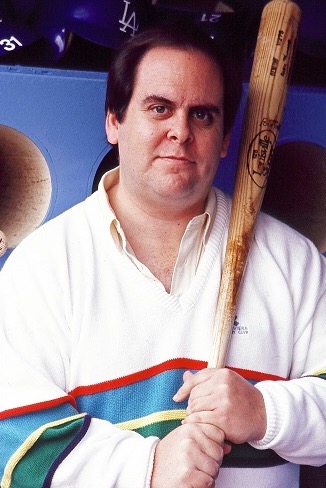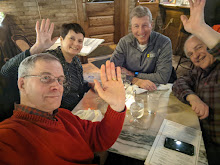Sara Meyer, the longtime producer and conscience of Minnesota Public Radio News, gave me a great book when I retired in May 2019. And the current virus quarantine is a great time to finally getting around to reading Joe Bonomo's No Place I would Rather Be, a history of Roger Angell's life writing about baseball for The New Yorker.
I was breezing along in the relatively early part of the book when this quote of Angell's hit me like a bucket of cold water.
"Baseball is stuffed with waiting."
We're now waiting for baseball, of course, and especially so for those of us who are ushers at the parks around the nation, Target Field in Minneapolis in my case. We live not only for the baseball, but for the social glue that the sport provides us.
 |
| I miss the kids at Target Field. They get me. |
The game has certainly changed in recent years. Too many parks -- that is to say: all of them -- cannot stand the sound of silence. And so we are inundated with game hosts and contests and music and kiss cams and decibels -- so many decibels.
Major League Baseball has, over time, chosen to push the game itself farther into the background in order to save it. We can debate whether it's working, but I choose for now merely to pull the game back on stage.
I had to go Googling to find the quote that Angell used. It was simple lede sentence in a paragraph about the New York Yankees comeback in the American League Divisional Series in 2017 against the Cleveland Indians, the team for which I've lived and died since I was a boy, even though I never lived in Ohio (I explained it all here one glorious afternoon the year before for my day job at the time).
Take a bite out of this tasty writing:
The Yankees won again last night, completing a come-from-behind three-game sweep against the Indians, with a stunning 5–2 win in Cleveland. Now we Yankee folks can sit back and wait for the Nats and the Cubs to settle their thing tonight in Washington, and wait also for the Yankees and the Astros to begin their A.L. Championship best-of-seven series in Houston tomorrow.
Baseball is stuffed with waiting. The Yanks went ahead early, on a solo homer by Didi Gregorius in the first, and another Didi shot, with a man aboard, in the third—both struck against the Indians’ well-rested ace Corey Kluber, and setting up a long out-counting wait at my house and all over Yankeeland. The Indians were up against the obdurate veteran C. C. Sabathia, whose eight strikeouts in the first four innings imposed a stunned semi-silence on Progressive Field. Four successive singles and two runs in the bottom of the fifth restored the roaring and drumming for the moment, but the Yankees’ narcotizing David Robertson, and then Aroldis Chapman, soon had us counting outs again, while the re-silenced Indians fans waited for winter. Here, at my place, I was waiting and sometimes screaming for the FS1 announcers, John Smoltz and Matt Vasgersian, to stop their flood of heavy expertise and Googled-up stats and allow us to pick up and share some of the beautiful, complex silences of the game. For a sample, they could listen to Ernie Johnson and Ron Darling, over at TBS, who had done the Cubs’ home-game loss to the Nationals at Wrigley Field earlier in the day without self-importance. This won’t happen, of course, but I was offended by a stupid little joke between Smoltz and Vasgersian in the booth just before the Indians’ last at-bats, at a moment when compassion for the appalled home fans and their millions of Midwest companions seemed appropriate. They did not honor this.
Our last and best waiting was produced by Brett Gardner, the forever Yankee lead-off man, in his ninth-inning at-bat against reliever Cody Allen, with Aaron Hicks on second and Tod Frazier on first. I was ready for this, one of Gardner’s patented wait-and-foul at-bats—a series of short, left-handed slashes and bonking fouls that cause the man on the mound to shrivel and age before our eyes. My scribbles about this at-bat came at the bottom of a page in my notebook, and the accumulating twelve pitches and six successive fouls went off the bottom and up onto the top of the next page before Gardner’s single to right center scored Hicks, and, after a botch on the relay, Frazier as well, for the last runs of the year out there.
One question for us Yankee fans is whether Aaron Judge can pick up a smidgen of waiting from Gardner’s example. Judge struck out four times in the game, and a record sixteen times in the series, almost always on breaking pitches down and away, which he could not resist. He did this without the smallest complaint—no bat-slappings or glances to Heaven—and kept his sufferings to himself. All we can look for, with proper patience, is for him to lay off those pitches, to learn to wait.
Joe Girardi had told us to expect an outcome like this in his statesmanlike interview before Game 3, so let’s try a little joy abounding. Just after the game, I heard from my old friend Allan, away in Prague for a family funeral, who e-mailed, “From the fourth inning on I followed every pitch on the Internet. It is now getting on for 6 a.m., but I am the happiest fan in the Western world.”
Angell's citation of "the beautiful, complex silences of the game" is proof, as if any is needed, not only of Angell's ability to reach deep into your heart by assembling letters on a page, but his full understanding of his subject. The game, if we can ever peel away the sideshow again, is a soundtrack of beautiful silence.
I was thinking about this the other day when trying to fix some of MPR's old NewsCut posts (a server change wiped out all of the images on 12 years of my work) and was reminded of Reggie Deal.
Years ago, Deal, who is blind, was on a mission to visit every Major League ballpark. He could tell what was happening by listening to the ball and bat and the crowd. And the silence, sometimes.
When he got to the Twin Cities, I helped arrange for him to get onto the field and meet Joe Mauer.
But back to the heart for a moment.
For an aging Indians fan, 2016 was the closest one will come to knowing the feeling of winning a World Series. The Indians held a 3-games-to-1 lead over the Chicago Cubs in the World Series, proceding to lose three straight to the Cubs.
 |
| Photo: Evan Frost/MPR News |
I don't know if Angell recognized it too, but he recognized heartbreak among the Indians fans in that article, insisting that compassion seemed appropriate, even when no one else did.
Today would have been opening day at Target Field. My plan was to work the game, then fly tomorrow to my hometown for my mother's funeral on Saturday, flying back on Sunday so I could be back at the park when the Twins opened a series against the Indians.
None of that, just as the notion of the Indians winning the series in my lifetime, was meant to be.
So we wait for better times -- and baseball -- in silence.













































